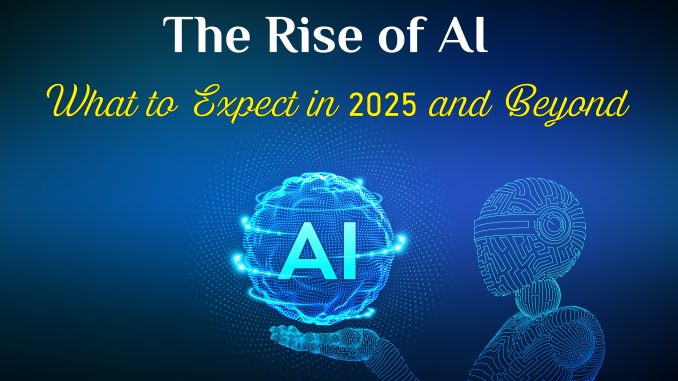
Artificial Intelligence (AI) is no longer science fiction—it’s reality. As we approach 2025, AI is not just changing how we live and work; it’s redefining what’s possible. From healthcare and finance to transportation and education, AI technologies are accelerating progress and driving innovation globally.
In this post, we explore the future of AI, key trends to expect in 2025 and beyond, and how individuals, businesses, and societies can prepare for the next big shift.
What Is AI and Why Is It Growing So Fast?
AI refers to machines designed to mimic human intelligence—learning, reasoning, and adapting to data. The rise of machine learning, natural language processing (NLP), and deep learning has rapidly expanded AI’s capabilities.
Thanks to the growth in computing power, big data, and cloud infrastructure, AI development has become faster, cheaper, and more accessible than ever before.
Top AI Trends to Expect in 2025 and Beyond
- AI-Powered Automation Will Go Mainstream
By 2025, businesses will widely adopt AI tools to automate repetitive tasks. From customer service chatbots to robotic process automation (RPA) in accounting, AI will boost efficiency and reduce human error.
Example: Over 50% of global companies are expected to adopt AI automation tools by 2025.
- Generative AI Will Reshape Content Creation
Tools like ChatGPT, DALL·E, and Sora are just the beginning. Generative AI will become a creative partner in design, writing, filmmaking, marketing, and more.
AI-generated music, videos, and even books will become common.
- AI in Healthcare Will Save Lives
Expect faster diagnostics, AI-assisted surgeries, and predictive analytics for disease prevention. Medical AI will be key in managing future health crises.
By 2030, AI is projected to reduce treatment costs by 20% globally.
- AI Will Reshape the Job Market
While automation may displace some jobs, it will also create demand for AI engineers, data analysts, AI ethics officers, and robotics technicians.
Upskilling in AI-related fields is crucial for future-proofing careers.
- AI Regulation Will Become a Global Priority
With growing concerns over privacy, bias, and misinformation, governments will begin implementing stricter regulations and ethical standards for AI development and usage.
The EU AI Act is a leading example of such regulation frameworks.
Industries AI Will Transform by 2025
| Industry | AI Impact Highlights |
| Healthcare | Diagnostics, remote care, predictive modeling |
| Finance | Fraud detection, algorithmic trading, AI advisors |
| Education | Personalized learning, AI tutors, grading automation |
| Retail | Virtual assistants, inventory forecasting, customer analytics |
| Transportation | Autonomous vehicles, smart logistics, route optimization |
How Businesses Can Prepare for the AI Era
- Invest in AI tools and platforms
- Train your workforce in AI-related skills
- Implement ethical AI policies
- Collaborate with AI startups and researchers
Will AI Replace Humans?
Not entirely. AI will replace tasks, not people. Human creativity, emotional intelligence, and ethical reasoning remain irreplaceable. The most successful individuals will be those who learn to work with AI, not against it.
Conclusion: The AI Revolution Has Just Begun
The rise of AI marks the beginning of a new era. As 2025 approaches, it’s no longer a question of “if” AI will change our world—but how ready we are to embrace it. Whether you’re a student, entrepreneur, or policymaker, now is the time to adapt, learn, and innovate with AI.
